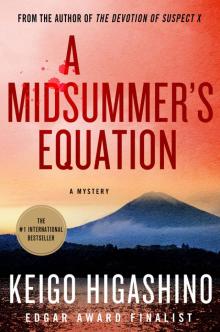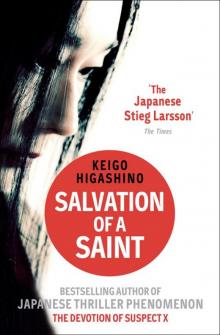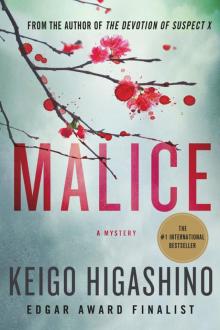- Home
- Keigo Higashino
Malice: A Mystery Page 7
Malice: A Mystery Read online
Page 7
After this little speech Kaga paused. Perhaps he was waiting for me to retort or attempt an explanation. I remained quiet.
“I think you probably considered the computer monitor yourself,” he went on after a moment. “As I said previously, the monitor puts out quite a bit of light. But the PC needed to be running. You could’ve turned off just the monitor, but that would’ve been dangerous. Rie was with you when you discovered the body, and if she had noticed that the computer was running but the monitor was turned off, that might’ve been enough to tip off the police to your trick right there on the spot.”
I tried to swallow, but my mouth was completely dry. I realized I was terrified of meeting Kaga’s eyes. He had seen right through my flimsy layers of subterfuge, right through my skull and down into the very thoughts that had been in my head.
“I’m guessing you left the Hidakas’ around five thirty. On your way back to your apartment, you stopped and called Mr. Oshima at Dojisha Publishing and asked him to come over right away to pick up your latest manuscript. Mr. Oshima had been expecting the manuscript by fax that day and was surprised by the sudden, urgent request to see him. Luckily for you, it’s a straight shot on the train from his office and he was able to make it to your apartment in thirty minutes. I noted that none of this was mentioned in your account. In fact, from what you wrote, it seemed as if Mr. Oshima had been intending to come that day all along.”
This, too, was true, but instead of saying anything, I just gave a long sigh.
“I hardly need to go into why you called Mr. Oshima over. You needed someone to corroborate your alibi. Hidaka’s computer called your house at exactly six thirteen, like you’d set it up to do. You’d turned off your own fax machine before then so you could take the call on your cordless phone. You picked up the receiver to listen to the scrambled noises of Mr. Hidaka’s fax program attempting to make a connection and then began your greatest performance. With electronic noise warbling in your ear, you begin talking as though you were speaking to another human. I call your performance great because, in fact, Mr. Oshima was completely taken in by it. After you had finished your solo one-act play, you hung up. On Hidaka’s computer’s side, the call was logged as a dialing error, and the job was suspended. Now, all that was left for you was a little cleanup. You merely had to discover the body with Rie Hidaka by your side. Then, before the police arrived, when she wasn’t looking, you needed to erase the record of the call off the computer.”
I noticed that somewhere along the way, he’d stopped reflexively bowing his head every time he said something. That bowing was the habit of a new recruit at school when speaking to a senior colleague. The change in attitude didn’t bother me, though. It was fitting given the facts of our current relationship.
“It was a decent trick. Even more impressive because you came up with it in such a short amount of time. However, you made one mistake.”
I had a feeling he was about to tell me what that was.
“You forgot about the real phone at the Hidakas’. If Mr. Hidaka had actually phoned you, then pressing the redial button on his phone should call this apartment.”
Inwardly, I screamed.
“Yet it didn’t. It called a place in Vancouver. According to the wife, Mr. Hidaka had placed a call early that morning, around six in the morning, to Canada. Of course, it might be possible to explain that one away. After he’d called your apartment, he could have attempted to call Canada only to hang up before actually letting the call go through. However, considering the time difference, that doesn’t make much sense. Someone who had gotten up especially early to make a phone call that very morning wouldn’t likely forget the time difference and mistakenly call again in the middle of the night.”
Kaga stopped talking and gazed at me. “That’s all.”
For a brief moment nothing was said between us. If Kaga was waiting for me to react, he was going to have to wait a long time. My mind was a blank.
“Nothing to say?” He sounded somewhat surprised.
Finally, I looked up and our eyes met. His were calm, unthreatening—not the look a detective would turn upon a suspect. That came as a relief, irrational though that may be.
“You never said anything about the manuscript,” I said. “What about the episode of The Gates of Ice on Hidaka’s computer? Even pretending your theory is correct so far, when did he write that?”
Tight-lipped, Detective Kaga looked up at the ceiling. I got the sense that he already knew what he was going to say, he was merely finding the right words to say it.
Finally, he spoke. “There are two possibilities. The first is that Mr. Hidaka had already written that much, and when you found that on his computer, you decided to use it to support your alibi.”
“And the other possibility?”
“The other one”—he looked back at me—“is that you wrote that manuscript. You could’ve had it with you on a disk and, in order to create your alibi, hurriedly copied it onto Hidaka’s computer.”
“That’s quite the theory!” I tried to smile, but my cheeks were too tight and my face felt frozen.
“I showed the manuscript file to a Mr. Yamabe at Somei Monthly, Hidaka’s publisher. According to him, it was clearly written by someone other than Mr. Hidaka. The wording was slightly different, and there were too many variances in things like line breaks and formatting.”
“So, er, you…” My voice came out in a hoarse rasp. I coughed to clear my throat. “You think I prepared that manuscript in advance because I was intending to kill him?”
“No, I don’t think that. Had you planned to use it to stand in for his work, you would’ve taken greater pains to match his style and format. His editor thought that wouldn’t be a terribly difficult thing to do for such a short section of a work that was already partially published. Also, given that a paperweight was the murder weapon, and that Mr. Oshima was summoned at the last minute to corroborate your alibi, I have to conclude that the murder was done on impulse.”
“So then why prepare the manuscript ahead of time?”
“That’s the question, isn’t it? Why did you have in your possession a manuscript for the next installment of The Gates of Ice? And even before we ask that question, we need to ask why you’d written it in the first place. I’m very intrigued by this point in particular. I think that in the answer to that question lies your motive for killing Mr. Hidaka.”
I closed my eyes to avoid full-blown panic. “This is all in your imagination. You have no proof.”
“True. That’s why I’m here today to search your apartment. I’m sure you know by now what it is I’m looking for.”
I didn’t answer.
“I’m looking for a disk containing the manuscript. Or perhaps I’ll find it on the hard drive of your word processor over there. In fact, I’m sure I will. If you’d only prepared the manuscript as part of an elaborate murder plan, you would have destroyed the evidence. But I don’t believe that. No, it’s definitely here, somewhere.”
I opened my eyes to find Kaga staring directly at me. Except this time I was able to accept his gaze without flinching. All it took was closing my eyes for a moment to settle myself completely.
“And if you find what you’re looking for, you’re going to arrest me?”
“I’m afraid so, yes.”
“What if I chose to turn myself in now?”
Kaga’s eyes went wide. He shook his head once. “Unfortunately, we’re past the point where it would be considered turning yourself in. Though I wouldn’t advise any attempts to resist arrest.”
“I see.” The strength left my shoulders. I felt despair; yet also a kind of relief. I no longer had to pretend. “When did you first suspect me?”
“The first night.”
“Really! Did I slip up?”
“You did.” He nodded. “You asked me about the estimated time of death.”
“Is that so strange?”
“Very. If you spoke with Mr. Hidaka after six o’clock a
nd knew he’d been killed before you reached the house at eight o’clock, then the murder would’ve taken place during that short two-hour period. Why go out of your way to ask what you already knew?”
“Oh.”
“Also, the next day, at that restaurant, you asked me the same question again. Then I was even more certain that my hunch was correct: You didn’t want to know what time the crime had occurred. You wanted to know what time the police thought the crime had occurred.”
He was correct. I’d been checking to see whether my trick had worked.
“Well, that’s fantastic. I think you’re probably a very good detective.”
“Thank you.” He bowed his head curtly. “You might want to get ready to leave. Though I will have to keep a close watch on you. There are plenty of cases where a suspect has been left alone with unpleasant results.”
“Don’t worry, I’m not going to commit suicide.” I laughed. The last came naturally, surprising even me.
“I should hope not,” Kaga said with a smile.
4
PURSUIT
KYOICHIRO KAGA’S NOTES
Four days have passed since I arrested Osamu Nonoguchi. Though he admitted the crime, his lips remain tightly sealed on one matter: his motive. Why did he kill a man who was his childhood friend and a benefactor? The chief has made it clear that, without a clear motive, we can’t bring this case to trial. Nonoguchi might recant his confession, and his lawyer might poke enough holes in our circumstantial evidence to create reasonable doubt. The chance that everything could fall apart in court is too great.
Yet despite repeated questioning, all he would say was “I just got angry and killed him in the heat of the moment. That’s all.”
This wasn’t nearly enough for us to establish motive, but I did have an inkling of the real motive. My first clue was the manuscript for The Gates of Ice.
I should mention that we did find the manuscript as I’d expected, on the hard drive of Mr. Nonoguchi’s word processor. Also, in his desk drawer, we found the disk he’d brought to the Hidakas’ on the day of the murder, which was, indeed, compatible with the disk drive of the computer in Kunihiko Hidaka’s office.
Yet I don’t believe this was a premeditated murder—an opinion shared by the entire investigation team. Which raises the question of why, that very day, Mr. Nonoguchi just happened to be carrying the next installment of The Gates of Ice on a disk in his pocket. And before we ask even that question, we need to know why Mr. Nonoguchi had written a manuscript for a work that was supposed to be Hidaka’s.
I had a working theory about this point in particular, even before I made the arrest. I was convinced that if I could trace this theory back to its logical origins, I would find the motive for this murder.
All that remained was to get Mr. Nonoguchi to corroborate my theory; but he proved uncooperative. Regarding the manuscript for The Gates of Ice, he said, “I wrote it on a lark. I brought it to Hidaka’s to surprise him. I told him if he wasn’t going to make his deadline, he could always use my version. Of course, he took it as the joke it was meant to be.”
I need hardly point out that this story was unconvincing. Yet when pressed further, the suspect simply said that it was my choice whether to believe him.
My team searched Mr. Nonoguchi’s apartment again, having examined only his desk and the word processor’s hard drive the first time around.
The second search resulted in eighteen pieces of evidence, including eight thick, spiral-bound notebooks, eight double-density floppy disks, and two file folders containing short, handwritten manuscripts. All of these contained numerous pieces of fiction, both short stories and novels. We confirmed that the handwriting in the spiral-bound notebooks and on the handwritten manuscripts all belonged to Mr. Nonoguchi.
What was of particular interest was the content of the writings. One of the floppies contained something startling—though if my theory is correct, entirely expected. This was a manuscript for The Gates of Ice. Not just the latest installment, but every installment that had been published so far.
I showed the manuscripts to Mr. Yamabe, Hidaka’s editor at Somei Monthly. His opinion:
“This is, without a doubt, a manuscript for The Gates of Ice as published. That said, even though the story is more or less the same, there are a few things in here that weren’t in the manuscripts I received from Mr. Hidaka. And others seem to be missing. Again, the word use and sentence structure is slightly different.”
In other words, these earlier installments showed the same differences from the printed version as the manuscript Nonoguchi attempted to use as part of his alibi.
The investigation team then obtained copies of every printed work of Kunihiko Hidaka’s, divided them up, and read them. (Several people on the team commented that it had been a long while since they’d read so much, and there was bellyaching all around.)
We discovered that the five full-length novels written in the spiral-bound notebooks in Osamu Nonoguchi’s apartment all closely matched works published by Kunihiko Hidaka. Despite slight differences in the titles, characters’ names, and settings, the general story lines were practically identical.
The floppy disks contained three more novels and twenty short stories, of which all the novels and seventeen of the short stories matched works by Mr. Hidaka. The three short stories that didn’t match were children’s stories that had been published by Mr. Nonoguchi.
As for the two short, handwritten works, no corresponding publications were found in Mr. Hidaka’s output. Based on the age of the paper, these appeared to have been written some time ago. Perhaps if we expanded the scope of our investigation, we might find something.
Finding so many manuscripts for works by another author was highly unusual. Moreover, the manuscripts were not identical to their published versions. The stories written in the spiral-bound notebooks had several notes in the margins and corrections had been made, making them seem more like works in progress than something finished.
My theory is that Osamu Nonoguchi had been working as Kunihiko Hidaka’s ghostwriter. I suspect that something in that relationship soured, leading to the present situation.
I proposed my theory to Nonoguchi in the interrogation room, but he flatly denied it: “You’re wrong.”
When I asked him about the stories in those spiral notebooks and floppy disks, he closed his eyes and fell silent. The investigator in the room with me tried to badger it out of him, but he wouldn’t talk.
That was as far as we were able to get—day after day, session after session—then today, in the middle of the interrogation session, something unexpected happened.
Osamu Nonoguchi suddenly put a hand to his stomach and complained of a sharp pain. The attack was so sudden and so severe, I was afraid he’d somehow smuggled in some poison and taken it.
He was taken to the police hospital immediately and given a full examination. The chief called me in shortly after with startling news: Osamu Nonoguchi has cancer.
* * *
I went to visit him in the hospital the day after he collapsed in the questioning room, first speaking briefly with the physician in charge of his case.
According to the doctor, the cancer had spread to the membrane around his internal organs. This was a dangerous phase of his cancer, and if he was to have any hope of surviving, it would require immediate surgery.
When I asked the doctor if the cancer was new or a recurrence after a remission, he told me that it likely was a relapse.
This news wasn’t a surprise. In our investigation, we’d learned that, two years prior, Osamu Nonoguchi had to have a portion of his stomach removed due to cancer and been forced to take several months off from his teaching job.
Nonoguchi hadn’t been back to the hospital until now, after he was arrested, even though, as the doctor told me now, he had probably known about the return of his cancer for some time.
I then asked the doctor if surgery would save Nonoguchi’s life. The doctor pond
ered this for a while, then finally shrugged. “I give him a fifty-fifty chance.”
That wasn’t the answer I wanted.
I took my leave of the doctor and went to visit Osamu Nonoguchi.
He was in a private room. “I feel bad that I get to lounge about here in the lap of luxury instead of going to prison,” he said with a weak smile, from his hospital bed. I realized it was more than just years that had aged his thin face since the time we’d been colleagues.
“How do you feel?”
“Not good, but considering the nature of my illness, I’d have to say I’m doing pretty well.”
I sat silent, next to his bed, for a while, until he turned to me and asked, “When will I be put on trial? If it takes too long, I might not make it.”
I was unsure if he was joking, though he had clearly already accepted that his death was inevitable and fast approaching.
“The trial won’t happen for a while. We don’t have enough evidence and detail to start.”
“Why not? I’ve confessed, and you have proof. Put me on trial and you’ll get a guilty verdict. Isn’t that enough? I promise I won’t change my story when I’m on the stand.”
“Actually, I wish you would change your story. Right now, it lacks a motive.”
“That again?”
“I’ll happily stop asking you about it if you tell me.”
“Like I said, there wasn’t any motive. It was an impulsive act, done in the heat of the moment. That’s all. I got angry and I killed him. There’s no reason or logic to it beyond that.”

 A Midsummer's Equation: A Detective Galileo Mystery
A Midsummer's Equation: A Detective Galileo Mystery The Devotion of Suspect X
The Devotion of Suspect X Journey Under the Midnight Sun
Journey Under the Midnight Sun The Name of the Game Is a Kidnapping
The Name of the Game Is a Kidnapping Salvation of a Saint
Salvation of a Saint The Miracles of the Namiya General Store
The Miracles of the Namiya General Store Malice: A Mystery
Malice: A Mystery